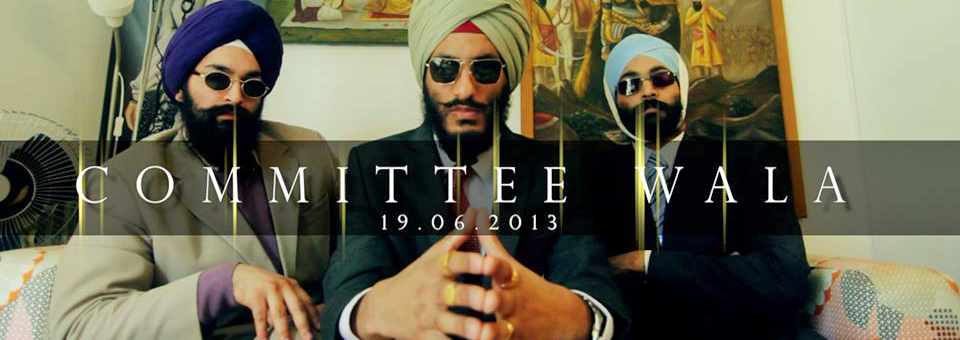Just over a week ago, my senior colleague here at naujawani, Ranjit Singh ‘Kuki’ Gill gave an interview to the PTC News network in a show titled ‘Khas Mulaqaat’. In a 30 minute broadcast time slot, some of the views he presented were in my opinion false, whilst others were categorically inaccurate; some further comments he made were misguided. The purpose of writing this piece today is to redress some of what was said and then to instigate further debate about the issues at hand and how they are covered by the mainstream media.
Every article that he has written for naujawani can be read here and should leave no reader with any doubt as to the dedication he has towards a better future in the Punjab. It is with that in mind that his comments in the interview will have come as a shock.
What would take most viewers by surprise is Ranjit Singh’s response when asked about Khalistan. His statement that the present Sikh cause was one to achieve the demands and betterment of Punjab is not without truth, but by questioning why Sikhs would want separation at a time when the World is coming closer together he was not only misguided but factually incorrect. Citing the examples of the EU and the African Union, Ranjit Singh did not take into account that nations within those unions have increasingly detached themselves from the empirical states that they belong to and there is a growing move to redefine national borders according to linguistic or traditional geographical boundaries. A case in point is that of Scotland where despite narrowly losing a referendum in favour of seceding from the United Kingdom, the recent overwhelming General Election victory by the Scottish nationalists would appear to suggest that a move away from London and the United Kingdom is inevitable. Arguably, they would remain a part of the European Union, but in order to have greater control over their future they are naturally seeking autonomy. Decentralisation within a larger continental union is becoming popular, unlike the nation-gathering of the Empires of yester-year. Moreover, his response showed no regard for the desires of the Sikh people as presented at the last Sarbat, held in 1986, where the resolution for an independent State free from the control of both India and Pakistan was unanimously accepted.
Perhaps most insensitively though, Ranjit Singh opined that the reception received by Akali politicians in recent weeks across North America was less than desirable. Senior members of the Badal-led Government were met with unprecedented protests and even the ignominy of having a shoe thrown at them. I would (and have) put it to Ranjit Singh that he has unequivocally misjudged the level of animosity that now pervades the Sikh Diaspora for the Badal cabal; year after year we have seen these corrupt and out-of-touch politicians rolled out to ‘hear’ our concerns and ‘answer’ our questions, all of which is a façade. Most commonly we are sat and subjected to the most belittling of ‘plans’ to better the Punjab through Akali Dal (Badal) chapters in the West, amongst other ridiculous notions. That pent-up frustration with ‘our’ Sikh political party has finally reached a point where it cannot go unchallenged and as our North American Sikh peers have shown, any representatives of the Badal-Dal will not be received graciously. I am not condoning any form of violence against them, but nor is any being propagated. Just as journalist Jarnail Singh threw a shoe at the Home Minister in 2009 for repeatedly ignoring questions about the unfettered freedom gifted to Jagdish Tytler (one of those responsible for the Delhi Genocide of 1984) Sikhs with few options left to engage with their politicians took the opportunity to make their feelings known. In Jarnail Singh’s case, the SGPC applauded his actions and offered him a paid media advisory role; why is it then that Sikhs of North America are being disavowed for the same sentiments? Not only has Ranjit Singh misjudged how the Akalis are seen in the Diaspora, but in defending them in the name of discourse and liberty, he has sullied what that means and from the interview he has lost a significant amount of respect because of it.
For visitors to this website who are unfamiliar with Ranjit Singh ‘Kuki’ Gill, he is a person of measured thinking and reputable character residing in Ludhiana, Punjab. I have known him personally for almost ten years now and he has been a writing colleague of mine at naujawani for the last five years. As can be heard in the afore-mentioned interview, at the time of the Indian State’s invasion of Darbar Sahib in June 1984, Ranjit Singh was a post-graduate student who had been accepted to undertake doctoral work in the United States. Upon seeing the carnage and the annihilation that had been attempted upon the Sikhs of Punjab, he like many others of his generation rebelled against the State, conspiring to assassinate perpetrators of the atrocities. By 1987, he had escaped the Punjab and was arrested on the run in the United States. Years of incarceration followed, first in the New York State Penitentiary and then in the Punjab. In 2009, his life sentence in a case concerning the assassination of the then Home Union Minister Lalit Maken was upheld and he faced a future behind bars. Partly thanks to the testimony given on his behalf by the daughter of Lalit Maken who had met and accepted why her father was targeted for assassination, Ranjit Singh’s sentence was commuted by the Commissioner of Delhi and he has for the last five years been trying to rebuild his life, but all the while maintaining his stance of wanting a better future for Punjab.
I have never questioned his dedication to the cause, but the interview has brought some statements to the fore that I need to question in more depth. As I understand it, the interview lasted for almost an hour, certainly longer than the 27 or so minutes which were broadcast on air. Ranjit Singh informed me that much of what he said in elaborating on certain points and clarifying his stance was edited out. It is important to note that he did not deny making the statements which can be clearly heard in the interview, but said that there is more to the discussion than has been presented. It is my assertion that one should know what to expect from certain broadcasters where they have editorial control over what is published, and that any person dealing with sensitive matters should seriously consider what words they use when speaking to them. As the editor of naujawani, I take great pride in the credibility that we have earnt from presenting a coherent and logical stance to any cultural or current affairs issue, whilst still maintaining the objectivity that I find omitted by other media outlets. To that end, I have invited that he elaborate on the comments made in the interview with us where any questionable viewpoint can be challenged in a manner more befitting broadcast media, than the weak fielding hosted by Vijaypal Singh of PTC News.
The interview, whilst damning, should not be seen in simple black and white terms, but is undoubtedly one that must be responded to, where the issues are rebutted as I have attempted to do with just two salient points here. That Ranjit Singh is a colleague of mine, and one whom I admire, might be perceived with some embarrassment by readers, but it should not. He is a writer on this site like any other – outside of the control or puppeteering of the editor; I have celebrated the numerous articles in which he has challenged the hegemony of the Badal-lad Akali party, and so it lies with me to rebut his arguments made on the PTC News interview. Having put this to him through this article and otherwise, I await his clarification on the interview and hope to share it with readers in due course.





